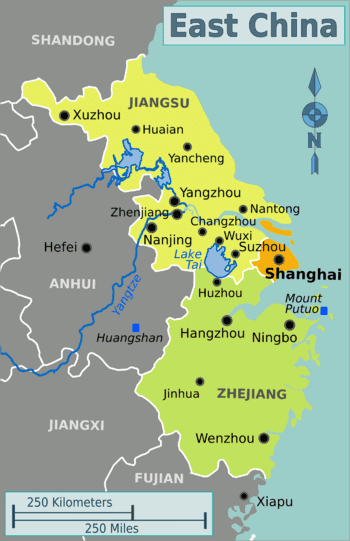East China
East China is a key area of China historically, politically, and economically.
The region is an economic powerhouse beyond even the Pearl River Delta in South China. If this area were a country, its population of 156 million (2010 census) would be 8th largest in the world (after Nigeria, ahead of Bangladesh), and its GDP of over $15 billion would be 12th (after Canada, ahead of Australia). The area has many millions of migrants from poorer provinces of China — especially Anhui just inland from it, and Sichuan — who come mainly to seek work.
It is also a very important area historically.
Regions
Cities
The main cities of the region include:
- Hangzhou (Zhejiang Province), capital of China under the Southern Song, 1127-1279; Marco Polo wrote the city is beyond dispute the finest and the noblest in the world.
- Nanjing (Jiangsu Province), capital of China under several dynasties, of the Tai Ping Kingdom in the 19th century, and of the Republic of China 1912-1949. Its history goes back to several hundred BCE and for most of that time it has been one of the most important cities in China.
- Ningbo (Zhejiang Province), a major trading port in the tea clipper era, still an important port and industrial city
- Shanghai, unlike other cities in the area, did not become very important until the 19th century, though some neighborhoods date back much further. Relics of the city's heyday — 1840s to 1930s — abound, a fascinating mixture of East and West. Today, Shanghai is the hub of the region and the financial and fashion center of China.
- Suzhou (Jiangsu Province), old city of canals and gardens, capital of one of the three states in the Three Kingdoms Period, 220-280 CE. Later it became a retirement destination for officials, many of whom built classical Chinese gardens.
- Wenzhou (Zhejiang Province), a busy seaport and industrial city
- Yangzhou (Jiangsu Province), an old trading city on the Yangtze, center of the salt trade for centuries.
There is a Chinese saying: Heaven has paradise, but Earth has Hangzhou and Suzhou.
Both cities are among the most-visited destinations for Chinese tourists, and also major destinations for international tourism. Their main attractions — the classical gardens of Suzhou and West Lake in the center of Hangzhou — are on the UNESCO World Heritage List.
All these cities are now quite modern, heavily industrialised, very busy, and still expanding.
Stay Safe
According to UNAIDS, 0.5% of Chinese sex workers are infected with HIV. One study reported that 5% of low-cost sex workers were infected. In one part of Yunnan province, the infection rate is estimated to be as high as 7%. The Chinese government has initiated programs to educate sex workers in HIV/AIDS prevention.
Rising HIV/AIDS rates among Chinese's elderly has been partially attributed to the use of sex workers.
China is a huge country that shows a huge regional difference in crime rates but in general it poses no more risk than most western countries. Although you may hear locals complaining about increasing crime rates, violent crime remains rare. Many tourists will more likely feel safer in China than in their home country.
|
Healthcare for foreigners Most major Chinese cities have clinics and hospitals that are more appropriate for foreigners, with English speaking and Western qualified staff. Although expensive, it is worth identifying them whenever you plan to stay in an area for a significant time. For non-urgent medical treatment, you may want to consider traveling to Hong Kong, Taiwan or South Korea for a higher standard of treatment which may not be particularly more expensive. |
Emergency numbers
The following emergency telephone numbers work in all areas of China; calling them from a cell phone is free.
- Patrol Police: 110
- Fire Department: 119
- (Government-owned) Ambulance/EMS: 120
- (some areas private-owned) Ambulance: 999
- Traffic Police: 122
- Directory inquiries: 114
- Consumer Protection: 12315

